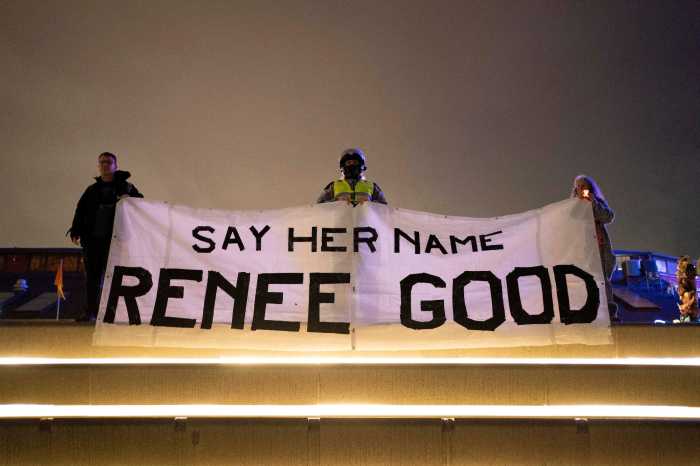BY ALINE REYNOLDS | There’s no clear-cut way of tracking hazing in the U.S. Military, a fact that has made it hard to identify red flags when soldiers like Army Private Danny Chen of Chinatown are on the verge of suicide.
Following the death of Chen and other soldiers in recent years that have committed suicide while on tours of duty, the military is considering mandatory training and other policy reforms specifically targeting hazing, according to officials from the Army, the Marine Corps and other branches of America’s armed forces, who spoke at a Congressional hearing on hazing held in Washington, D.C. last week.
The hearing, organized by the House of Representatives’ Armed Services Committee, comes on the heels of the recent suicides of several military personnel that have been traced to physical and verbal abuse, including the death of Marine Corps Private Hamson Daniels McPherson last year and Army Specialist Brushaun Anderson in 2010. Private Chen was found dead last October in a guard tower in Kandahar, Afghanistan. An Army investigation revealed that the soldier was racially taunted and physically abused by his peers in the months leading up to his death.
“From an Army perspective, the challenge for us is that there’s no punitive or statutory title for hazing,” said Army Sergeant Major Raymond Chandler. “I’m not comfortable with the quality of the statistics, because you have to really drill down into each one of the charges to see whether or not it was an assault, which may have been a fisticuffs, or if it was an assault [tied to] hazing.”
The Army, he added, lacks a formal, unit-based policy or training program focused on hazing, which is commonly defined as persecution or harassment with meaningless, difficult or humiliating tasks.
Chandler assured the members of Congress that a plan is in the works to more effectively combat harassment. For starters, military chiefs have distributed a letter to all members of the armed forces warning against the maltreatment of fellow officers and, starting this summer, the Marine Corps will be holding a leadership symposium to teach officers about hazing and other forms of misconduct.
“We are in the very early stages, but I expect a very rapid turn,” said Chandler of the reforms. “Army Secretary John McHugh has demanded swift action, and I believe we’ll have it.”
Chandler along with Marine Corps Sergeant Michael Barrett and the other military officials stressed that, despite potential policy or enforcement gaps, hazing is not permitted in the U.S. military and defies its core values of honor, courage and commitment.
Certain remedial measures are already in effect, the officials said. Marines, for example, receive “value-based” training a minimum of 11 times during an average of four years of service, according to Barrett. The U.S. Coast Guard’s discipline and conduct manual released last October includes hazing and states that condoning the misbehavior automatically implicates supervising officers, according to Coast Guard Officer Michael Leavitt.
“When a young man or woman is hazed, it’s not corrective training, it’s abuse. And there is a significant difference between abuse and corrective training,” said Chandler.
Chandler added, “The American people trust we will hold perpetrators of hazing accountable for their actions, and we take that trust seriously.”
While the military claims to have improved its zero-tolerance policy against hazing in recent years, instances of physical and verbal harassment persist and continue to contribute to suicides, the Congress Members asserted.
“As I talk to family, friends, teachers and those who knew Danny, I keep hearing a familiar refrain: How could this happen?” said U.S. Congresswoman Nydia Velasquez.
Velasquez said she appreciates the military’s intent to tackle hazing but is seeking more specifics on its plan to do so.
“I need to hear how the leadership of the military and services, of all services, going forward is going to make this policy part of everyday life, just like a soldier formation, so it’s second nature,” said Velasquez.
Similarly, Massachussetts Congresswoman Niki Tsongas cautioned the Army against “spinning its wheels.”
“I appreciate the efforts that you all are putting into this, but I have to say… there’s a deja-vu quality to it,” said Tsongas. “As you deal with this issue, I would encourage you to put in place metrics, objective ways, of measuring the outcomes of all this hard work that you do.”
California Congresswoman Judy Chu, the aunt of Lance Corporal Harry Lew, has amassed nearly 3,000 letters and petitions from concerned American citizens demanding that the military put a stop to hazing.
Chu recounted the gruesome abuse Lew endured in the hours prior to his suicide and decried the army’s judicial leniency when it came to penalizing the men implicated in his death.
“What punishment was given? Virtually nothing,” said Chu. “In Harry’s case, three Marines were charged, one Marine was given just one month in confinement, two were found not guilty by a jury of their peers, fellow Marines. All of them are free to continue with their military careers, be promoted, and continue their behavior.
Chu added, “Even a jay walker would get worse punishment.”
Push to hold Chen trials in the U.S.
As for Private Chen, advocates are continuing to put pressure on the Army to hold the trials of the eight soldiers implicated in his death on U.S. soil, the first of which begins in Afghanistan on Wednesday, April 4. The New York chapter of the Organization of Chinese Americans (OCA-NY) has collected more than 3,000 petition signatures supporting the cause and will be embarking on a nationwide, university-based campaign to garner additional support for the domestic setting of the trials.
New York City Council Speaker Christine Quinn along with Council Members Margaret Chin, Mathieu Eugene and Deborah Rose last week sent a letter to Army Commanding General James Huggins, asking that the Chen trials be transferred to a U.S. court-martial.
“As this process moves forward, the only way to ensure the trials are transparent and credible is to hold them in the United States,” said the Council Members. “It is not feasible, nor advisable, for the Chen family to travel to Afghanistan.”
Chen’s family plans to travel to Alaska in May for an Army-arranged memorial to commemorate the deceased soldier, according to Frank Gee, a spokesperson for Chen’s parents, Su Zhen Chen and Yan Tao Chen.
The Chens delivered a solemn message to Congress in preparation for last week’s hazing hearing.
“They don’t want any parent to have to go through the same thing again,” said Gee. “The second thing they said is that it’s tragic, because the Chinese believe that, when you lose your parents, you lose your past. When you lose a son, you lose your future.”




































